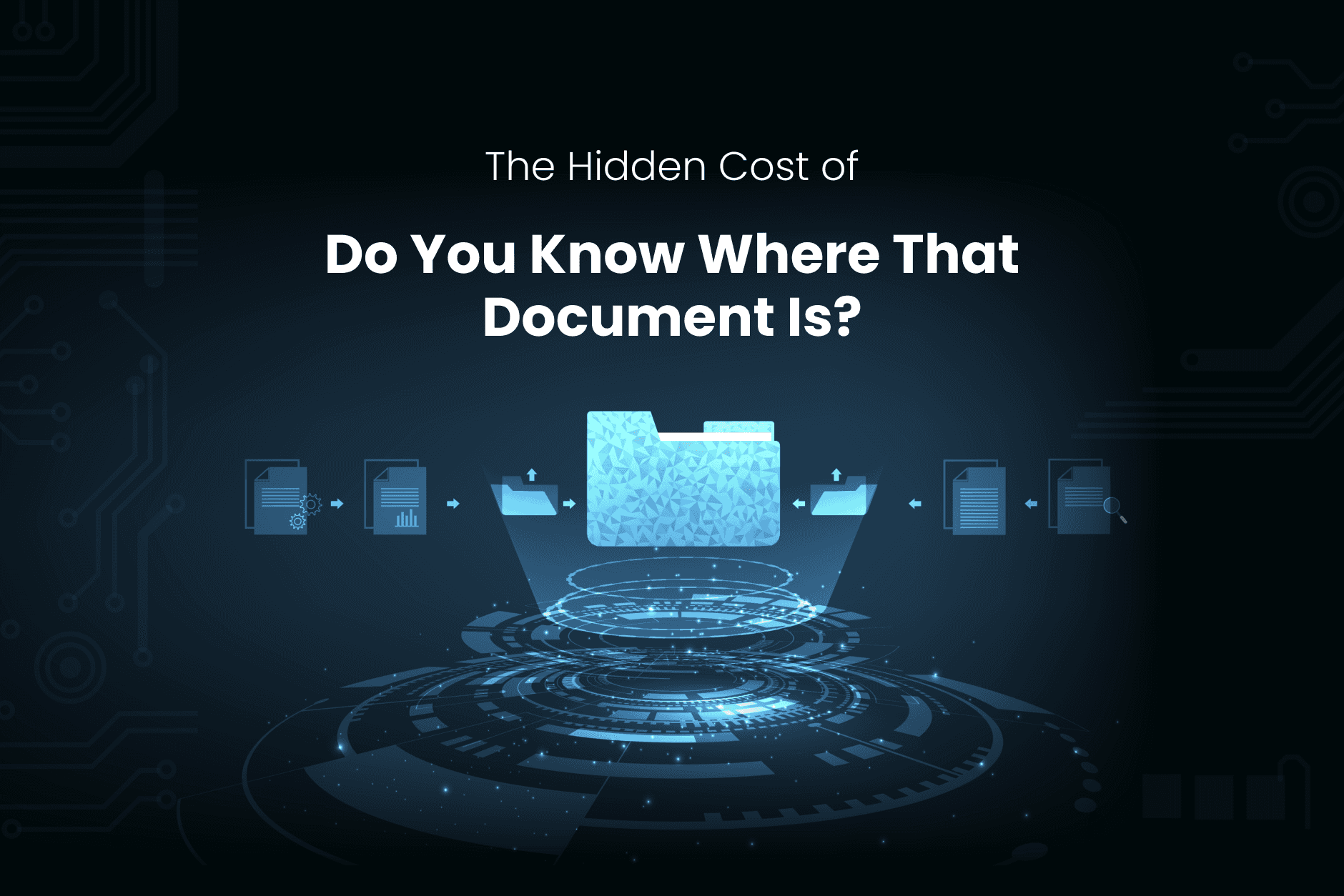Jul 17, 2025
|
4
min read
The Hidden Cost of 'Do You Know Where That Document Is?'

Himanshu Srivastava
Founder & CEO
"Do you know where that document is?" This innocent question costs your business more than you realize.
The Hidden Productivity Drain
The Average Knowledge Worker:
Spends 2.5 hours daily searching for information
Wastes 30% of their time on document hunting
Interrupts colleagues 12 times per day with "where is" questions
Recreates existing work 25% of the time
Annual Cost Per Employee:
Time lost: 650 hours per year
Salary cost: $32,500 (at $50/hour)
Productivity loss: $45,000 in missed opportunities
Total hidden cost: $77,500 per employee
The Ripple Effect
Individual Impact
Frustration and stress from constant searching
Decreased focus and productivity
Delayed decision-making
Missed deadlines and opportunities
Team Impact
Constant interruptions disrupt workflow
Knowledge bottlenecks around senior staff
Inconsistent information across team members
Reduced collaboration efficiency
Business Impact
Slower time-to-market for products
Higher operational costs
Reduced competitive advantage
Lower employee satisfaction and retention
The Real Cost Calculation
For a 20-person team:
Annual searching cost: $1,550,000
Lost productivity: $900,000
Employee turnover cost: $200,000
Total annual cost: $2,650,000
The Solution: Intelligent Knowledge Management
Prgya eliminates the hidden costs:
Instant Information Access
AI-powered search across all documents
Natural language queries
Instant answers with source citations
No more hunting through folders
Reduced Interruptions
Self-service knowledge access
Fewer "where is" questions
Independent problem-solving
Improved team focus
Consistent Information
Single source of truth
Automatically updated knowledge
Synchronized team understanding
Reduced information silos
Measuring the Recovery
Time Savings:
Document search: 2.5 hours → 10 minutes daily
Information retrieval: 15 minutes → 30 seconds
Team interruptions: 12 → 2 per day
Cost Recovery:
Productivity gain: 25% increase
Time to decision: 60% faster
Employee satisfaction: 40% improvement
Annual savings: $2.1M for 20-person team
ROI Calculation
Investment: $2,000/month for knowledge management
Savings: $220,000/month in productivity gains
ROI: 10,900% annually
The Transformation
Before:
"Where is the latest pricing sheet?"
"Can you send me the contract template?"
"What was decided in last week's meeting?"
After:
Instant access to all information
Self-sufficient team members
Focus on high-value work
Implementation Strategy
Week 1: Audit current document chaos
Week 2: Implement centralized knowledge system
Week 3: Train team on new workflows
Week 4: Measure productivity improvements
The Bottom Line
"Do you know where that document is?" shouldn't be a daily question. Every search is a productivity tax your business pays.
Stop paying the hidden cost of document chaos. Invest in knowledge management and watch your team's productivity soar.
Every day, your team asks the same question: "Do you know where that document is?" It seems harmless enough—just a quick interruption, a momentary pause in productivity. But what if I told you this innocent question is costing your business thousands of dollars every month?
The True Cost of Document Hunting
Let's do the math. The average knowledge worker spends 2.5 hours per day searching for information. For a team of 10 people earning $75,000 annually, that's $90,000 per year spent on document hunting alone. That's nearly a full salary wasted on searching instead of creating value.
The Ripple Effect of Information Inefficiency
But direct search time is just the tip of the iceberg. Information inefficiency creates a cascade of hidden costs:
Delayed decision-making when critical information is buried in emails from six months ago
Duplicated work when teams can't find existing resources and recreate them from scratch
Missed opportunities when sales teams can't quickly access the right case study or product information
Employee frustration leading to decreased engagement and higher turnover
The Psychology of Information Fragmentation
Beyond the financial impact, constant information hunting creates a psychological burden. When employees can't quickly find what they need, it triggers stress and reduces confidence. This "search anxiety" affects decision-making quality and overall job satisfaction. Teams start creating their own informal documentation systems, leading to further fragmentation and inconsistency.
The Prgya Solution: Turn Cost Centers into Profit Centers
What if instead of asking "Do you know where that document is?" your team could ask your AI agent and get instant, accurate answers with source citations? Prgya transforms your document chaos into a structured, searchable knowledge base that works like having a knowledgeable colleague who never forgets where anything is.
Real ROI: From Search to Success
Consider this transformation:
Before Prgya: Sarah from sales spends 30 minutes searching for a specific case study, interrupts three colleagues, and finally finds an outdated version. Total time lost: 45 minutes across four people.
After Prgya: Sarah asks the AI agent "Show me case studies for manufacturing companies with 100+ employees" and gets three relevant, up-to-date case studies with source citations in 30 seconds.
That's a 9000% improvement in efficiency for a single search.
Stop Paying the Document Tax
Every minute your team spends searching for information is a minute not spent serving customers, developing products, or growing your business. It's time to stop paying the "document tax" and start investing in knowledge efficiency.
With Prgya, you can reclaim those lost hours and redirect them toward activities that drive real value. Your team's collective knowledge becomes a strategic asset, not a scattered liability.
The question isn't whether you can afford to implement Prgya—it's whether you can afford not to. Start your free trial today and calculate your own document hunting savings.



